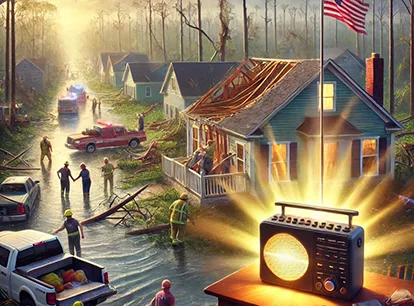
Radio: A Lifeline in Crisis for Hurricane Victims in North Carolina
When disaster strikes, staying connected becomes a lifeline. For the people of North Carolina affected by Hurricane Helene, radio has been a critical source of information and hope. Denise Potter, a resident of Hendersonville, NC, shared her harrowing experience of living through the storm and how radio played a crucial role in helping her and her community navigate the crisis.
Cut Off, But Not Alone
Denise’s ordeal began early Friday morning when Hurricane Helene unleashed its full force. She lost power almost immediately, and soon after, cell service became unreliable, leaving her isolated from her family and her husband, who was working at Advent Health Hospital. The storm brought down trees and power lines, cutting off many residents from the outside world. But for Denise and others like her, radio became the one reliable source of information.
“When the power went out and my cell service was gone, I was scared and alone,” Denise recalls. “But then a neighbor mentioned they had a battery-powered radio, and I remembered my old clock radio. I tuned in, and that’s when I started hearing the Radio broadcasts. Those broadcasters were true heroes.”
Radio: A Voice of Hope
Throughout the storm, local radio stations in Asheville continued to broadcast 24/7, providing critical updates and connecting those in need with help. Radio DJs became a lifeline for people seeking information about loved ones, emergency services, and available resources.
Denise reflects on the impact these voices had on her and her community: “Every day, I would listen and cry, hearing people call in for help, and the DJs would say, ‘We’re going to get you help.’ They didn’t just share news—they connected people, told them they were loved, and let them know they weren’t alone.”
A Community United by Radio
The radio stations provided vital information, from locations offering food and water to updates from Governor Cooper and FEMA. For many in Western North Carolina, radio became a crucial resource in the face of devastation. Businesses were destroyed, people were stranded, and communication was difficult, but radio kept the community connected.
As Denise points out, “People would never know this information if it weren’t for radio. I don’t know what we would have done without it.”
A Reminder of Radio’s Importance
Denise’s story highlights the vital role radio continues to play in emergencies, especially as some automakers and tech companies push to remove AM radios from cars. While smartphones and the internet may seem like the go-to for information, in times of disaster, these technologies can fail. Radio, however, kept broadcasting, even when other communication methods didn’t.
“I can’t stress enough how important radio was to us,” Denise says. “When cell towers and power lines are down, radio is still there. It’s a lifeline that can’t be replaced.”
How You Can Help
As North Carolina rebuilds, we must remember the essential role radio plays in keeping communities connected during times of crisis. Help ensure that radio remains accessible by contacting your members of Congress. Automakers are trying to remove AM radios from vehicles, but we can make a difference.
Text AM to 52886 to urge your representatives to support legislation that keeps AM radio in cars. Let’s ensure that radio remains a vital resource for all Americans, especially when they need it most.
